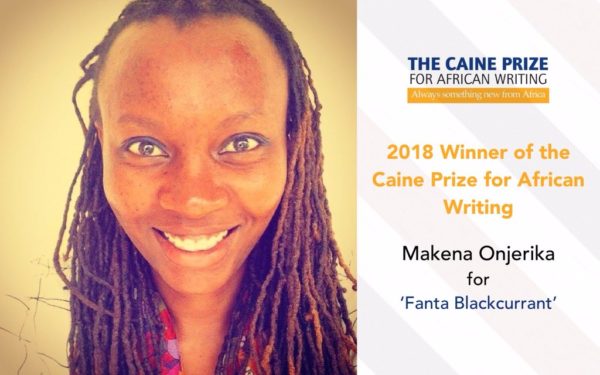
Kenya’s Makena Onjerika has won the 2018 Caine Prize for her short story “Fanta Blackcurrant,” published in Wasafiri in 2017, making her the fourth writer from her country to do so—following wins by Binyavanga Wainaina in 2002, Yvonne Owuor in 2003, and Okwiri Oduor in 2013.
The £10,000 Caine Prize is awarded to the best 3,000-10,000-word short story by an African writer. The 2017 prize was awarded to Sudanese poet Bushra al-Fadil for his “The Story of the Girl Whose Birds Flew Away.” The 2018 prize was announced at a ceremony and dinner at Senate House Library, London, held in partnership with SOAS and the Centre for African Studies. The 2018 panel of judges was chaired by Ethiopian novelist Dinaw Mengestu and included Nigeria’s Lola Shoneyin, journalist Ahmed Rajab, and the prize’s 2008 winner and 2007 finalist Henrietta Rose-Innes. Mengestu stated:
“The winner of this year’s Caine Prize is as fierce as they come – a narrative forged but not defined by the streets of Nairobi, a story that stands as more than just witness. Makena Onjerika’s ‘Fanta Blackcurrant’ presides over a grammar and architecture of its own making, one that eschews any trace of sentimentality in favour of a narrative that is haunting in its humour, sorrow and intimacy”.
Here is a description of “Fanta Blackcurrant” from the Caine Prize:
Narrated in the first person plural, “Fanta Blackcurrant” follows Meri, a street child of Nairobi, who makes a living using her natural intelligence and charisma, but wants nothing more than ‘a big Fanta Blackcurrant for her to drink every day and it never finish”. While it seems Meri’s natural wit may enable her to escape the streets, days follow days and years follow years, and having turned to the sex trade, she finds herself pregnant. Her success stealing from Nairobi’s business women attracts the attention of local criminals, who beat her and leave her for dead. After a long recovery, Meri ‘crossed the river and then we do not know where she went’.
Makena Onjerika was chosen from a five-name shortlist that included: South Africa’s Stacy Hardy, for “Involution,” published in Short Story Day Africa’s Migrations: New Short Fiction from Africa; and the Nigerian trio of Nonyelum Ekwempu, for “American Dream,” published in Red Rock Review and republished in The Anthem; Olufunke Ogundimu, for “The Armed Letter Writers,” published in New Orleans Review‘s The African Literary Hustle; and Wole Talabi, for “Wednesday’s Story,” published in Lightspeed Magazine.
ANNOUNCEMENT: Congratulations to Makena Onjerika, Winner of the #CainePrize2018 for ‘Fanta Blackcurrant’ published by Wasafiri (2017).
Chair of Judges, Dinaw Mengestu, praises its narrative as “haunting in its humour, sorrow and intimacy”https://t.co/ziAd8Byiim#CainePrize2018 pic.twitter.com/72QEC2tKni
— The Caine Prize for African Writing (@CainePrize) July 2, 2018
Makena is a graduate of the MFA Creative Writing programme at New York University, and has been published in Urban Confustions and Wasafiri. She lives in Nairobi, Kenya, and is currently working on a fantasy novel.
Previous winners of the Caine Prize are: Sudan’s Leila Aboulela (2000); Nigeria’s Helon Habila (2001); Kenya’s Binyavanga Wainaina (2002); Kenya’s Yvonne Owuor (2003); Zimbabwe’s Brian Chikwava (2004); Nigeria’s Segun Afolabi (2005); South Africa’s Mary Watson (2006); Uganda’s Monica Arac de Nyeko (2007); South Africa’s Henrietta Rose-Innes (2008); Nigeria’s EC Osondu (2009); Sierra Leone’s Olufemi Terry (2010), Zimbabwe’s NoViolet Bulawayo (2011); Nigeria’s Rotimi Babatunde (2012); Nigeria’s Tope Folarin (2013); Kenya’s Okwiri Oduor (2014); Zambia’s Namwali Serpell (2015); South Africa’s Lidudumalingani (2016); and Sudan’s Bushra al-Fadil (2017).
Earlier this year, the Caine Prize was hit by departures and speculations: Lizzy Attree, the Prize Director since 2011, left and joined Short Story Day Africa; and then novelist Alain Mabanckou resigned from the panel of judges. Last month, however, the Prize named a new Administrator in Dele Fatunla.
Congratulations to Makena Onjerika.









COMMENTS -
Reader Interactions